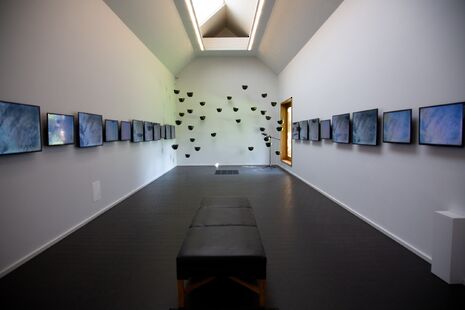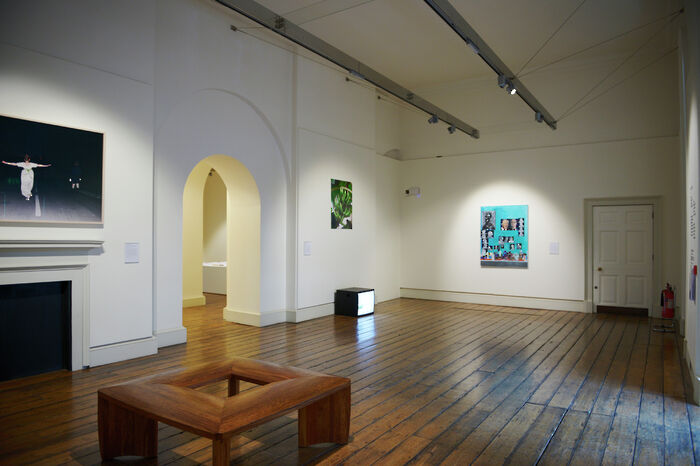YOKO ONO SKY PIECES reveals the triumph of hope
Natasha Schmittzehe reflects on the latest exhibition to arrive at the Heong Gallery, an exploration of the infinite sky by Yoko Ono

Weather breathing life into artwork seems an unlikely causational link. Yet with the mirroring screens on the walls of the Heong Gallery showing clouds clearing up above, a feeling of hope encircles the room; a hope far greater than a simple move towards hotter, sunnier days.
The mirroring screens of YOKO ONO SKY PIECES give new meaning to 'Sky TV'. An idea born in 1966 when live film was finally coming into momentum, this particular piece consists of a closed-circuit camera recording the sky in real-time. It documents the landscape with an artistic eye, yet also reflects the universally-familiar mundanity of a view that we take for granted every day.
Yoko Ono's artwork is one of stark dichotomies
This panoramic view which, in its simplicity, straddles the line between realism and the visionary, encapsulates the malleability of Ono’s art. Her work is one of stark dichotomies. A key complexity at play is the way she toys with the concept of memory. The live streaming of the sky encourages us to return to childhood halcyon days, days where we would look up in awe, attempt to make out the weird and wonderful shapes of the clouds, let our imaginations wander.
Ono includes many installations that allow us to interact with our childhood and unlock our more dreamy, idealistic selves. ‘Air capsules’ resemble the gobstoppers we might have once stared at with greed and longing; a chess game composed solely of white pieces creates a fantastical, Alice in Wonderland-esque aura. Seeing many people climb on the slides and ladders on the gallery lawn, I understood how Ono’s artwork can be seen as not only contemplative, but playful and tongue-in-cheek too.
The sky is a fabric we can all have a share in, appropriate and derive any meaning we so choose.
However, the sky does not only trigger happy memories for Ono. Hungarian war helmets hang ominously at the back of the room and remind us how the sky is also a painful, unsettling reminder for the artist as a place from where the bombs fell on her native Japan. A series of poems casually displayed on the gallery walls feature the recurring motif of holes. Ono's writing evokes both the piercing of the sky by these bombs and also the utter sense of void and devastation left in the wake of wartime destruction.
Yet the jigsaw puzzle pieces inside the Hungarian war helmets suggest that ultimately hope and freedom can prevail. Ono is one of the most iconic advocates for world peace, and uniting puzzle pieces is here analogous to the need to unite in the face of war and discord. The sky is an important symbol for an all-encompassing whole. One of the small, inconspicuous, almost Post-It sized messages around the Heong Gallery, inscribed in handwriting identical to Ono’s, is ‘Many rooms, many dreams, many countries in the same space…’. This idea of ‘many’ in the ‘same space’ not only conveys how Ono’s exhibition acts as a microcosm for hopes and dreams, but that by combining different elements of realism and different elements of our human experience, one can create a utopic vision of the world, where truly ‘the sky’s the limit’.
Although Ono’s work is highly conceptual – and its attendees at the private viewing included prolific figures such as Ai Weiwei and John Dunbar – her art is not restricted to an elite. Certainly its complexity should not be mistaken for inaccessibility. Being able to take away a small jigsaw puzzle piece from the exhibition gave me the opportunity to shape my own takeaway: that, much like art, the sky is a fabric we can all share in, appropriate and derive any meaning we so choose. The sky’s eternal nature is what makes it such an appropriate tool for reflection and in turn brings to the fore the idea that anything can be deemed art and individual thought is a work of art in itself. Whether one is ‘artistically educated’ or not is irrelevant. The viewer is as much of an artist as the creator.
YOKO ONO SKY PIECES is available to view at the Heong Gallery until 5th October 2019.
 Interviews / Lord Leggatt on becoming a Supreme Court Justice21 January 2026
Interviews / Lord Leggatt on becoming a Supreme Court Justice21 January 2026 Features / Are you more yourself at Cambridge or away from it? 27 January 2026
Features / Are you more yourself at Cambridge or away from it? 27 January 2026 News / Reform candidate retracts claim of being Cambridge alum 26 January 2026
News / Reform candidate retracts claim of being Cambridge alum 26 January 2026 News / Report suggests Cambridge the hardest place to get a first in the country23 January 2026
News / Report suggests Cambridge the hardest place to get a first in the country23 January 2026 News / Cambridge psychologist to co-lead study on the impact of social media on adolescent mental health26 January 2026
News / Cambridge psychologist to co-lead study on the impact of social media on adolescent mental health26 January 2026










